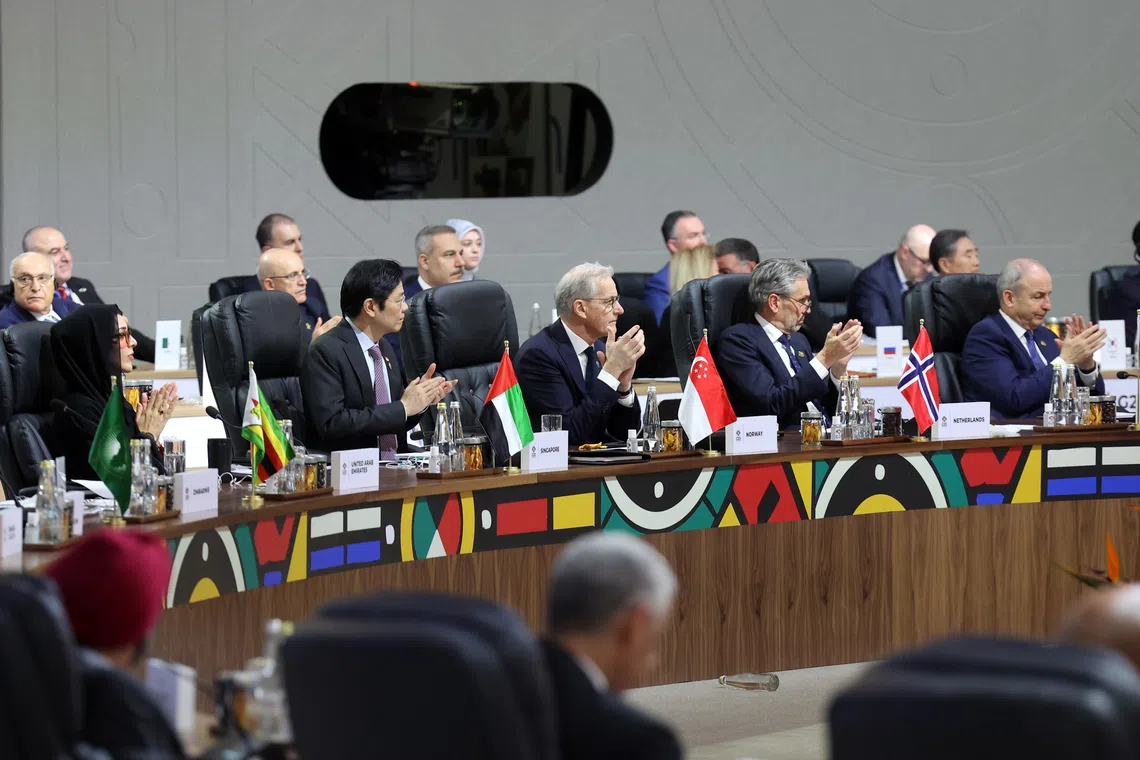JOHANNESBURG – Flexible multilateralism is one way forward as the world works out how to reform the global institutions and rules to address today’s challenges, Prime Minister Lawrence Wong said at the Group of 20 (G-20) summit on Nov 22.
This means that instead of being paralysed by old ways of doing things,
smaller groups can start laying the foundations for a refreshed system
through plurilateral agreements, with others coming on board later.
Countries should also build new partnerships, linking up regions, blocs and like-minded economies in mutually beneficial ways, he added.
PM Wong made these points on the opening day of the historic summit in Johannesburg, during a working session attended by leaders of the world’s biggest economies.
The meeting this year is the first ever to be held in an African country. South Africa, as G-20 president, has focused the attention on issues affecting the world’s poorest nations, such as widening economic inequality and debt sustainability for developing countries.
In his opening address to the summit, South African President Cyril Ramaphosa said tackling the issues faced by the developing world was vital in an interconnected world for stability and security, and to reduce the risk of conflict.
He then called on G-20 leaders to adopt the declaration at the start of the meeting, rather than at the end of the summit on Nov 23 as has customarily been done.
The meeting is being held amid a boycott by US President Donald Trump over
widely discredited claims of white South Africans being persecuted in their own country.
Mr Ramaphosa said: “We should not allow anything to diminish the value, the stature and the impact of the first African G-20 presidency.
“This G-20 Leaders’ Summit has a responsibility not to allow the integrity and the credibility of the G-20 to be weakened. In fact, from this summit we should have a sense that the G-20 has been strengthened.”
During the working session, PM Wong noted that the unravelling of the rules-based multilateral order, coupled with digital technologies reshaping the way business is done, would most acutely impact developing countries.
At the Asia-Pacific Economic Cooperation summit in South Korea earlier in November, he had
called on its leaders to reform the World Trade Organization (WTO)
to make it more outcome-oriented. He reiterated this at the G-20 meeting.
The WTO’s consensus rule means all member countries have to agree before new trade deals can be reached, but such consensus has proven elusive in recent years.
While building a new global economic architecture will require significant effort and political will, the G-20 has the ability and responsibility to play a key role, noted PM Wong. The grouping accounts for 85 per cent of the world’s gross domestic product.
“Singapore stands ready to do our part and work with all members towards this objective.”
To this end, the work under way can be complemented through flexible multilateralism, and the city-state supports minilateral and plurilateral tie-ups which can serve as pathfinders, he added.
Like-minded economies can also build partnerships that can form the foundations of a more resilient and secure multilateral trading system, said PM Wong.
He cited the inaugural trade and investment dialogues that the Comprehensive and Progressive Agreement for Trans-Pacific Partnership (CPTPP) countries held with ASEAN and the European Union, which took place on Nov 20.
The CPTPP, a free trade agreement first signed in 2018, evolved out of a small group founded by Singapore, along with Chile, New Zealand and Brunei. The bloc now has 12 members, including Japan, the United Kingdom, Canada and Mexico.
PM Wong said the dialogues will deepen partnerships on issues such as trade and investment facilitation, digital trade, supply chain resilience and regulatory coherence.
In the same way, more can also be done to bring the free trade areas and free trade blocs in Africa closer to South-east Asia and ASEAN, he added.
Singapore has also
launched the Future of Investment and Trade Partnership
to bring small and medium-sized economies together to support fair and open trade.
The informal partnership among 14 countries focuses on practical collaboration on investment, trade and dispute resolution, among other things.
PM Wong emphasised that countries must commit to the core foundations of the multilateral system, which remain relevant today.
“That means upholding international law, and the norms and principles that guide state behaviour,” he said. “That is critical to continued peace and stability in the world.”
The G-20 comprises 19 countries – Argentina, Australia, Brazil, Canada, China, France, Germany, India, Indonesia, Italy, Japan, South Korea, Mexico, Russia, Saudi Arabia, South Africa, Turkey, the UK and the US – plus the EU and the African Union.
Singapore is not part of the G-20, but has participated as a guest country for almost two decades. PM Wong is attending the summit at the invitation of Mr Ramaphosa.
The US will take over the rotating presidency in 2026, and Mr Ramaphosa has said he will symbolically hand over the presidency to an empty chair if necessary.

